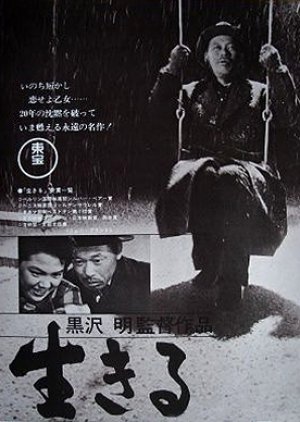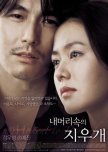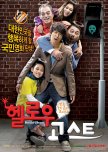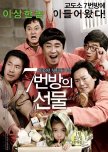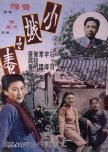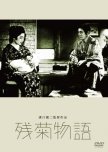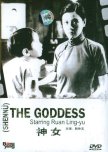
It's starts with the description of the protagonist's life - He's killing time, he's never actually lived - and a joke - Someone never taking a day off from work so no one realizes how unimportant his job really it - where themes get beautifully tied at the end of the movie. Then we have the journey of those women through all those bureaucrats trying to find a solution to their complaint, only to be sent to go in circles. I thought it was great but came to appreciate it even more by the end of the movie.
The first half of the movie follows the journey of a typical bureaucrat discovers he doesn't have long to live, only to realize he hasn't been alive much these past 20 years. He hasn't formed any warm relationship to go back to and get support, he hasn't done anything enjoyable and fun, and finally he hasn't done anything that'll make him appreciated and remembered. He was in daze trying to figure out the meaning of life and how to live properly.
The second half is a study of bureaucrats, and of humanity. It's about how human become desensitized to life when they can't see the bigger picture. Work in the government is like a war zone, and each wants to protect their turf, without caring about the functions and duties of the government as a whole. This causes a lot of senseless paperwork and no work actually being done. What was interesting here is how all bureaucrats reacted to our protagonist as he becomes this anomaly in the organization.
The story moves smoothly, the themes intact, and no scene was there to kill time. Also this type of movie one should pay attention to everything going on, on the screen. Like the reaction of the protagonist of losing his old had, or the people in the background preparing for a birthday, only to sing happy birthday once our hero found a meaning to his life. Definitely one can be reborn at any time, and it deserves a celebration.
The cast and director are of the most popular so there's no need to just repeat how awesome they are, but I just want to say I include myself now with those amazed with them.
2h23 minutes well spent. I will leave with my favourite quotes:
"You were a slave of your own life. Now you will become its master"
"It's our duty to enjoy life. Wasting it is desecrating God's gift"
"We have to be greedy for life"
"Greed is a virtue, especially the greed for enjoying life"
"People strangle themselves in their daily life"
Cet avis était-il utile?

Cette critique peut contenir des spoilers
Misfortune Teaches Us the Truth
What would you do if you had six months left to live? When we are young, aflame with dreams and a perfect view of what our world will be we never think that one day due to life circumstances we might become a mere cog in a machine and the weight of corporate or public bureaucracy will extinguish that flame with its inertia crushing in on us. If we are not careful each day can become the same without making any difference in the world. Director Kurasawa breaks through the darkness of merely enduring the days by elevating a civil servant nicknamed "The Mummy" who hasn't really lived in 20 years to hero status. The hero's journey is not without suffering and heartache, and a behemoth of a monster to face before he leaves this plane of existence. With the sands of the hourglass rapidly streaming out he has one goal to reach, one thing to do to have made his life worth living and in the final moments to give it meaning.Ikiru begins with a death sentence being handed out to the Public Works Chief, Watanabe Kanji. Watanabe sits at his desk stacked high with papers just as he has for 30 years without taking a sick day, shuffling and stamping the papers validating his reason for being there. Once 20 years ago, he submitted a proposal for making the job better only to be shot down. Now he uses the proposal pages to wipe his glasses.
Upon finding out he has stomach cancer he is devastated. Kurasawa gave us a brilliant scene as Watanabe leaves the hospital so absorbed in his own thoughts that the world is silent. When he is jarred into reality the loud noises of life intervene once again. His son and daughter-in-law only want his money to buy a house and don't even ask what's wrong when they find him sitting in the dark. With no one to talk with, in a powerful moment he covers his head and cries himself to sleep.
At a chance meeting in a bar, Watanabe meets a small time writer. The writer plants seeds in his brain about no longer being a slave to life but being its master. Never having ordered a drink before Watanabe asks for help in having a night of fun out. The writer takes him out on a raucous night on the town. At their last stop the piano player asks for suggestions and Watanabe asks for "Life is Brief". In a low deep voice, the older man sings as the pianist plays silencing the revelers around them as the listeners reflect on the words of the song and Watanabe's grief.
A young girl from his office shows up the next day at his house because she needs his stamp to hand her resignation papers in. When he asked why she is leaving she tells him the boredom is killing her, that the only thing of interest that's happened in over a year is when he didn't come into the office. Her youthful exuberance and their casual meetings lay the step for his next revelation. He needs to make something to feel useful and relevant. Happy (Re)Birthday Watanabe Kanji!
With the energy of a man possessed he determines to answer the pleas of some local women who have been given the run around about a cesspool in their neighborhood. The women want it filled in and turned into a park but had been shuffled between 20 different departments before being sent back to Public Works.
The film jumps to his funeral and the last half of the movie is shown in flashback as the mourners piece together his motivations and what courageous steps he took as he fought the machine he was a cog in by wearing it down to have the park built. At first the upper echelon patted themselves on the back saying he had nothing to do with the new park. After they leave the cogs in different departments start comparing notes and realize how hard he fought even as he was dying to do something worthwhile, no small feat in a world of petty bureaucratic fiefdoms.
The cogs are jarred out of their complacency and vow to make a difference and not let the machine kill their desire to make meaningful changes. But as they find out as well, the machine doesn't like change, making Watanabe's work all the more heroic.
There are moments in Ikiru that will give you pause, make you misty-eyed, and even laugh. As the mourners gossip and take credit your blood will boil at the injustice and cause you to cry out for Watanabe. The silenced voices of small cogs eventually join the viewer in being advocates for the man willing to change and willing to make a change, regardless of the cost. A man no longer afraid to keep persevering in the face of the word "no". No longer having the time or energy to hate. No longer afraid of death. This hero had only one enemy-time and only one super power-tenacity.
Watanabe had faced an existential crisis. Not only had he been handed a death sentence but he was faced with the realization that he had only been going through the motions for 20 years, wasting the precious gift of life. We are all handed a death sentence the moment we are born, we just don't know its date. Ikiru is a beautiful film that asks the viewer as much as the central character to self-reflect on their life and its meaning, whether it is being lived with purpose. The final scene of Ikiru is poignant and reminds us all that Life Is Brief, remember to live it while you can.
9/16/22
Cet avis était-il utile?

